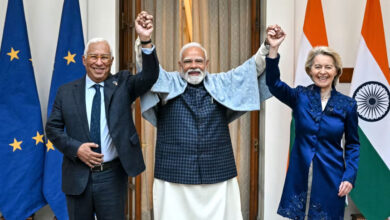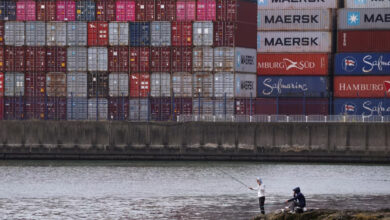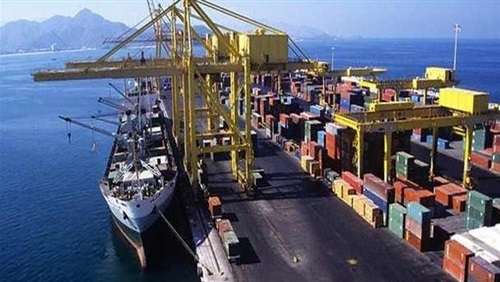A few weeks ago, in a meeting with Minister of Trade and Industry Rachid Mohamed Rachid, I asked how the uncertainty over Egypt’s future leadership was affecting investment in the country–a portfolio Rachid has overseen since the departure of Mahmoud Mohieldin for the World Bank.
As expected, the minister dismissed political concerns as besides the point: foreign companies, he said, were investing in Egypt, pouring millions of dollars into glass factories and cement plants and agri-business and countless other sectors. Mr. Rachid, whose own background as former chairman of Unilever Egypt is in consumer goods, argued that companies were not coming to Egypt to engage in speculation on real estate or the stock market, but to build a presence over several decades to take advantage of a large domestic market with a growing middle class. They are in it for the long-term, and are not worried about the short or medium term political horizon.
In last week’s National Democratic Party conference, the message was similar: the economy, not politics, held center stage. Ministers announced that they wanted to redouble their efforts at economic reform, through launching a second phase of new laws and regulations to achieve the 8 percent growth president Hosni Mubarak is targeting. Politics–specifically, the nomination of a candidate for the September 2011 presidential election–will be dealt separately at a later date.
Perhaps the top priority of those currently in the cabinet is simply to implement the policies they have worked on, in some cases, for decades. It’s sobering to be reminded that the person who is perhaps responsible for some of the most important economic shifts of the last decade, Minister of Finance Youssef Boutros-Ghali, has been toiling away as a high-level policy functionary since 1989. YBG, as he is often called, fought numerous political battles from different positions to get his ideas implemented, as well as placing his protégés, such as Mohieldin, in positions of influence. The story of the past decade has been the triumph of his viewpoint.
If you talk to economic policymakers or businesspeople, there is a sense of growing tire with the endless speculation over the identity of Egypt’s next president. But there is also widespread agreement over the direction of economic policy–subsidy reform, a greater role for the private sector, deregulation of energy industries, cutting red tape, lowering tariffs and other measures that have taken place. Many see these changes in the economic structure of the country more important than any argument about who will be president. The thinking is that there are more important problems: failing education, high unemployment, a trade balance that sees millions leave the country, poor infrastructure that is hurting the competitiveness of Egyptian businesses, and more.
The political process, on the other hand, is so opaque that many seem to have simply given up on trying to guess. It is widely held that no matter who the next president is, many of the economic policies will be going in the same direction as the same ones planned today that are endorsed by the World Bank and the International Monetary Fund, and are being financed by the European Union, the African Development Bank and countless other lenders and donors. At most, the difference between a Gamal Mubarak or Omar Suleiman or Ahmed Shafiq or any other candidate will be one of pace, not direction. Likewise, no likely candidate would be expected to take Egyptian foreign policy in a direction that would scare off foreign investors, isolate Egypt in the global economy or risk bringing it under the type of punishing sanctions now being imposed on Iran because of its nuclear program.
It is striking that, at a time when many of the world’s most advanced economies are facing major policy choices concerning their economies–the UK’s drastic cuts, Spain and Greece’s unmanageable debt, the US’ massive public deficit, France’s pension reform–and with all the public upheaval these entail, Egypt is proceeding on a track laid down before the global financial crisis. Many of the reforms already implemented were necessary and have worked out well. Others, such as pension reform and the coming health insurance law, will take years to be fully implemented. Some, like making mortgages widely available, may revolutionize home ownership for the middle class–a middle class that is growing and whose tastes are rapidly changing, if the arrival of supermarket chains, giant furniture retailers and international fashion labels are anything to go by.
In this brave new world, the economic reformists are proposing, everything keeps on getting better. Many economic policymakers around the world would envy their Egyptian counterparts' position: sheltered from politics by a police state, they can implement their strategies unimpeded by protests or a strong opposition.
But we can see where this model leads in Tunisia, a country that thanks to its small size and good education levels was able to develop a sizable middle class that is more prosperous than any in the Arab World outside the oil-rich countries. Raw economic figures are not everything: in Tunisia, while being comparatively better off, a moribund and extremely corrupt political scene is driving protests that are only about economic issues on the surface. What started out as a protest by unemployed graduates has brought in people from all walks of life to rant against an absurdly repressive political system and rampant corruption, notably in the ruling family.
Deep down, economic well-being is not merely about absolute facts and figures: it is also about a sense of justice about the distribution of income and opportunity. Egypt’s economic reformists may be generating higher levels of growth and more jobs, but, without a political vision, are they generating a sense of optimism about the future?




